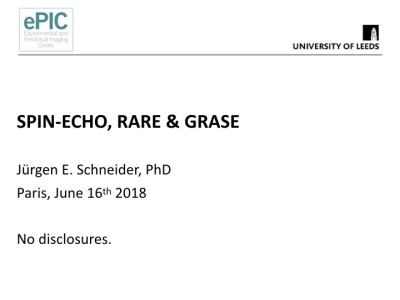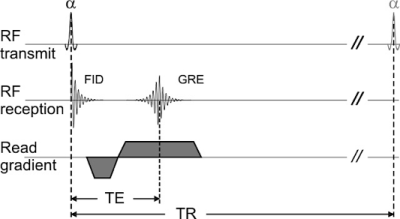Joint Annual Meeting ISMRM-ESMRMB • 16-21 June 2018 • Paris, France

| Weekend Educational Course Physics for Physicists |
||||||||||||||||||||
|
Physics for Physicists: Part 3
Weekend Course ORGANIZERS: Matthias Günther, Herbert Köstler
Saturday, 16 June 2018
Skill Level: Intermediate to Advanced
Session Number: WE-01C
Overview This course will describe commonly used imaging pulse sequences and their building blocks, data acquisition and artifact suppression strategies, and basic image reconstruction techniques. Target Audience MR physicists and engineers, pulse sequence developers and clinicians who want to deepen their understanding of MRI acquisition and reconstruction methods. Individuals who will likely benefit most from the course are those who have recently completed or will complete a graduate educational program in MR physics, chemistry, applied mathematics or engineering and those practitioners of MR with extensive practical experience but seek to obtain a more systematic foundation. Educational Objectives As a result of attending this course, participants should be able to: -Express a systematic understanding of pulse sequence building blocks and components; -Show an in-depth understanding of advanced data acquisition strategies, and their potential and limitations; -Describe common approaches to address motion; -Describe state-of-the-art fast imaging techniques; -Discuss advanced image reconstruction algorithms; and -Identify common artifacts and understand how to reduce them.
|
||||||||||||||||||||
|
Physics for Physicists: Part 4
Weekend Course ORGANIZERS: Matthias Günther, Herbert Köstler
Saturday, 16 June 2018
Skill Level: Intermediate to Advanced
Session Number: WE-01D
Overview This course will describe commonly used imaging pulse sequences and their building blocks, data acquisition and artifact suppression strategies, and basic image reconstruction techniques. Target Audience MR physicists and engineers, pulse sequence developers, and clinicians who want to deepen their understanding of MRI acquisition and reconstruction methods. Individuals who will likely benefit most from the course are those who have recently completed or will complete a graduate educational program in MR physics, chemistry, applied mathematics or engineering, and those practitioners of MR with extensive practical experience but seek to obtain a more systematic foundation. Educational Objectives As a result of attending this course, participants should be able to: -Express a systematic understanding of pulse sequence building blocks and components; -Show an in-depth understanding of advanced data acquisition strategies and their potential and limitations; -Describe common approaches to address motion; -Describe state-of-the-art fast imaging techniques; -Discuss advanced image reconstruction algorithms; and -Identify common artifacts and understand how to reduce them.
|
||||||||||||||||||||
| Back | ||||||||||||||||||||
| The International Society for Magnetic Resonance in Medicine is accredited by the Accreditation Council for Continuing Medical Education to provide continuing medical education for physicians. |


